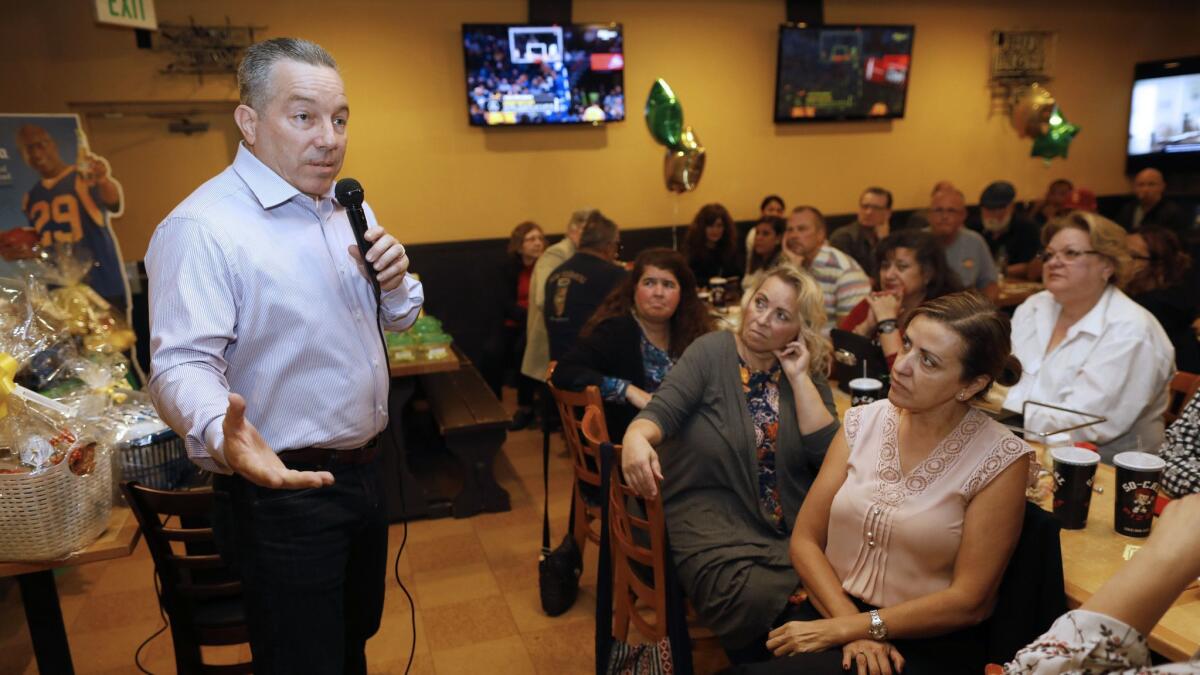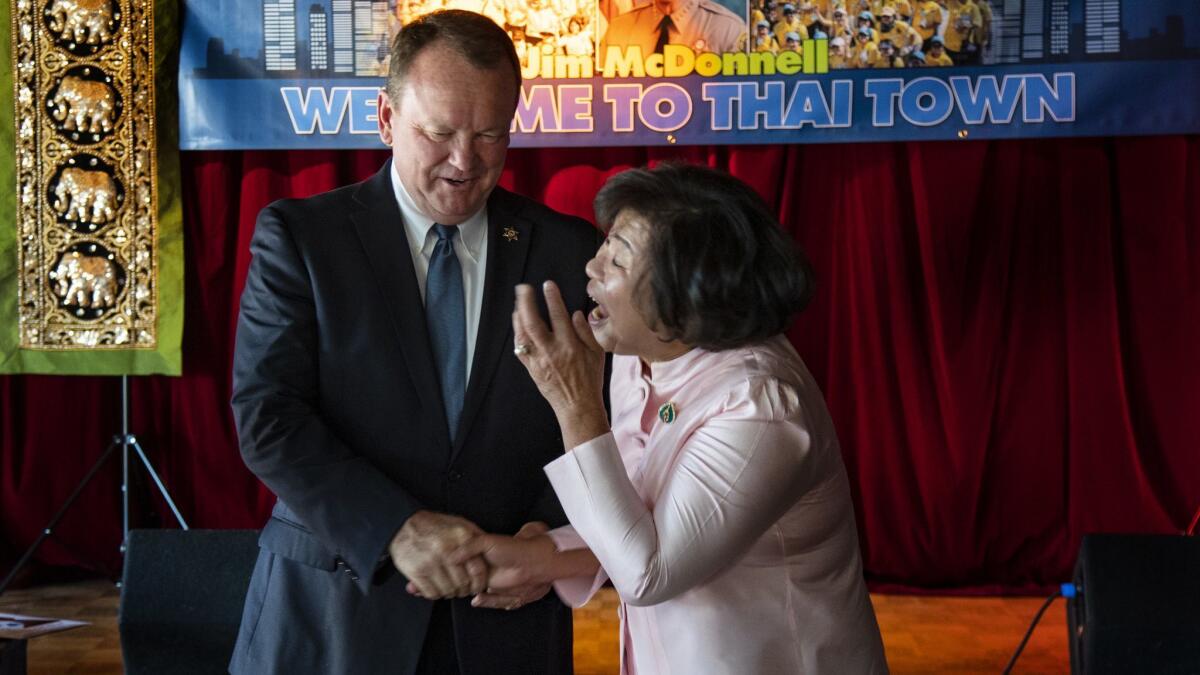Marking a shift, the race for Los Angeles County sheriff may be up for grabs

- Share via
On Tuesday, voters will decide who should take over one of the most powerful law enforcement jobs in the nation, in a contest that few may even realize appears on the crowded Los Angeles County ballot.
The race for sheriff could be historic. It pits the establishment incumbent against a lesser-funded political upstart in a battle that was never supposed to be this close.
Sheriff Jim McDonnell has been forced to catch up after running a tepid campaign before the primary, when retired Sheriff’s Lt. Alex Villanueva stunned observers by knocking him into a runoff.
If Villanueva wins, he’ll become the first person to unseat a living L.A. County sheriff in more than 100 years.
The Spanish-speaking Democrat says he’s the “progressive choice” who will kick immigration agents out of the jails, support alternatives to incarceration and expel corrupt officials he says have lingered from the previous administration — promises that earned him endorsements from an immigrants rights group and the county Democratic Party.
“We will not allow our jails to be a pipeline to deportation,” Villanueva said at a recent forum.
McDonnell says he’s made significant improvements, such as curbing jail violence and boosting mental healthcare behind bars, and that he has far more experience at the highest levels of law enforcement. The former Republican, now an independent, says he wants to focus on policies, not partisanship.
“I’m very proud of what we as a team in the Sheriff’s Department have been able to do for the past four years. We’ve been able to reform a department that was seriously in trouble, to be able to put us on a track to restore trust in our community,” McDonnell said at an event last month. But the race doesn’t break down into neat policy themes.
Villanueva, who calls himself a reformer, has criticized one of McDonnell’s best-publicized reform efforts: trying to give the district attorney’s office names on the “Brady List,” a confidential department roster of about 300 deputies with histories of misconduct.
Villanueva, who says he’s been the victim of unjust discipline, has called the roster a “fake list” compiled from retaliatory investigations. That echoes the sentiment expressed by the Assn. for Los Angeles Deputy Sheriffs, the rank-and-file union that sued McDonnell to block disclosure and has given at least $1.32 million to an outside group supporting Villanueva.
Villanueva says he would start a “truth and reconciliation” process to analyze whether the list is accurate.

McDonnell, calling himself a “progressive police leader,” initially opposed SB 54, the “sanctuary state” law that limits cooperation between local law enforcement and federal immigration agents. McDonnell had argued it would not allow for inmates to be transferred to immigration authorities and could lead to more immigration enforcement in the community. He agreed to the final bill that allows U.S. Immigration and Customs Enforcement to use office space in one of the jails — a stance that’s drawn ire from immigrants rights advocates.
Villanueva said he would not let ICE agents step inside the jails, but would “march [inmates] out ourselves and give them to ICE,” a comment some have interpreted as signifying an even more direct cooperation with immigration authorities.
In many ways, Villanueva may be the perfect foil for McDonnell.
He is department-bred, having served three decades in the tan-and-green uniform but never rising to the upper ranks. The U.S. Air Force veteran is supported by state Sen. Kevin de León and the Los Angeles County Federation of Labor, but raised only $156,000, with his supporters most centered in eastern parts of the county and around La Habra Heights, where he lives.
McDonnell, 59, brought in $1.2 million, with the highest concentrations of his donors in Los Angeles, Long Beach and Beverly Hills. He’s also backed by an additional $954,000 from an outside group and counts Los Angeles Mayor Eric Garcetti and Dist. Atty. Jackie Lacey among his endorsers. He started as an outsider with high-level credentials from the Los Angeles and Long Beach police departments, and won in 2014 vowing to overhaul the troubled Sheriff’s Department.
McDonnell’s tough stance on discipline, however, has riled many of his employees.
Villanueva, 55, has acknowledged that he was suspended for 5 days and again for 10 days in the early 2000s for allegedly failing to timely report derogatory statements made by another employee. He said the claims were bogus and were retaliation for vocalizing his belief that the department discriminated against Latino deputies.
He said the discipline was wiped from his record as part of a settlement he reached after suing the department.
Later, in 2012, a black custody assistant sued the department and Villanueva, claiming that after a fire drill, Villanueva referred to him as a “knuckle dragger,” which the deputy perceived to be a racial slur.
Villanueva denied making the comment and said there was no finding of wrongdoing. The county paid $10,000 to settle the case. An attorney for the deputy, Dwayne Perry, confirmed there was no misconduct finding but declined to comment further.
Villanueva admits he took the lieutenant’s test four times before being elevated to that rank.
The Professional Peace Officers Assn., a union representing about 6,000 department employees including sergeants and lieutenants, has said Villanueva’s inexperience in high-level management is proof he’s not fit to lead. That union has spent at least $750,000 to support McDonnell.
The other deputy union, Assn. for Los Angeles Deputy Sheriffs, announced Thursday that 82% of its members responding to a recent poll expressed no confidence in McDonnell, in large part due to criticism over his handling of a chronic deputy shortage. About a quarter of polled members responded to the survey, a participation rate that the union says is high. Both unions have said that morale is low and deputies are exhausted from overtime.
Whoever is chosen to run one of the nation’s largest law enforcement agencies will have to confront the ongoing struggle to recruit more deputies onto the 9,400-member force. The job also involves managing a $3-billion budget that pays for the nation’s largest jail system,18,000 staff members and police services for 42 cities and the sprawling jurisdiction of unincorporated L.A. County.
The department may be infamous to most Angelenos as the center of a jail abuse scandal that resulted in the conviction of former Sheriff Lee Baca. But it has suffered other recent controversies, including allegations of racial profiling, claims of sexual abuse at the women’s jail and reports of secret societies of tattooed deputies that glorify excessive force.
Most voters, though, may not care about the specifics.
Political experts say that like other local nonpartisan races, the sheriff’s election may hinge on the information that appears directly on the ballot: name and job title.
“Even people who are really educated and active are really largely confused about what’s happening on the ballot,” said Jessica Levinson, a Loyola Law School professor who teaches election law.
She said that dynamic will help McDonnell, since voters are more comfortable picking the person who’s already listed as having the job of sheriff.
Latino turnout could be key. Villanueva, who has Puerto Rican and Polish-American heritage, was most strongly supported in the June primary by voters in heavily Latino areas like Southeast Los Angeles, the San Fernando Valley and Pomona, according to a Times analysis.
More Latinos are expected to vote in the upcoming election than in any midterm in L.A. County history due to the growing size of the Latino population, said Matt Barreto, a UCLA political science professor who also runs Latino Decisions, a polling and research firm.
“In nonpartisan elections in L.A. County, [Latinos] have very strong support for Spanish-surname candidates or Latino candidates because there is a sense they will provide better representation for the community,” Barreto said.
Still, whites make up the largest racial voting bloc and tend to vote for white politicians, a factor that helps McDonnell, said Fernando Guerra, a political science professor at Loyola Marymount University.
Whatever the outcome, some experts say it’s clear the nature of the sheriff’s race has changed. What was once a long-held, easily reelected position may now be a more competitive job. A national push for criminal justice reform has meant candidates may no longer be able to rely on a singular tough-on-crime narrative.
“In the past it was easy to win on being a crime-fighter,” said Guerra. “But now it’s much more nuanced: We want you to be against crime, but we also want you to be a reformer, and we don’t want as many people in jail and prison.”
Times staff writers Maloy Moore and Matt Stiles contributed to this report.
Twitter: @mayalau
More to Read
Sign up for Essential California
The most important California stories and recommendations in your inbox every morning.
You may occasionally receive promotional content from the Los Angeles Times.











